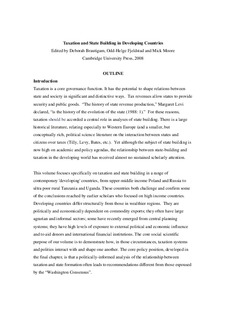Taxation and State Building in Developing Countries
Book
Permanent lenke
http://hdl.handle.net/11250/2474678Utgivelsesdato
2008-01-01Metadata
Vis full innførselSamlinger
- Publications [1488]
Originalversjon
Cambridge: Cambridge University PressSammendrag
Developing countries face new and pressing challenges as they strive to build more effective and accountable public institutions. These difficulties differ from those experienced historically by OECD countries, yet patterns of state-society interaction, including taxation, remain central to the process. This book explores the vital links between taxation and state-building in a range of low and middle income countries, including China, Russia, Poland, Chile, Tanzania, Uganda and Ghana. It analyses whether taxation can provide the focus for constructive state-society bargaining and if global programmes of tax reform might be modified to take more account of state-building objectives. This is a book for both scholars and policymakers. It combines rigorous scrutiny of the evidence with practical suggestions for policy change. The contributors address two broad questions:
How do taxation and sources of public revenue affect state-building and governance in contemporary developing countries? What sort of arrangements might be politically feasible to enable governments to tax more effectively, equitably and sustainably, and hence improve the chances for constructive bargaining with citizens over tax?
